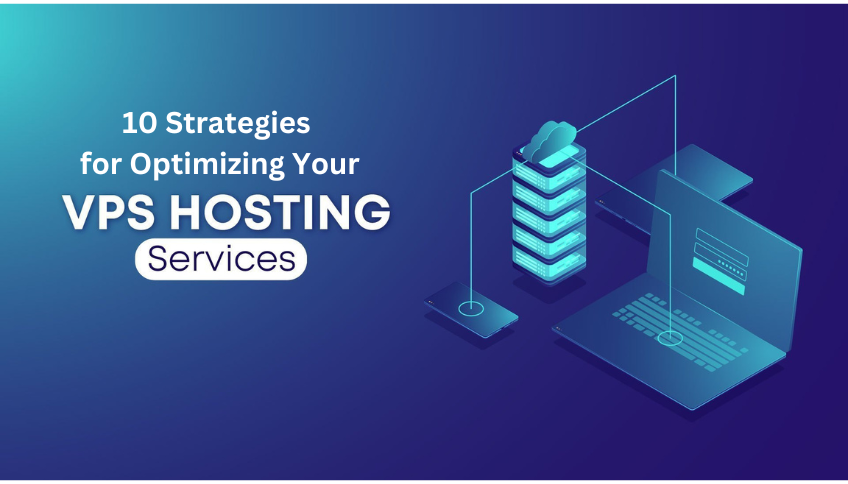10 Strategies for Optimizing....
In the ever-evolving..
By Admin / 13 February

In the ever-evolving landscape of online businesses and applications, having a reliable and high-performance Virtual Private Server (VPS) is crucial. VPS hosting services offer a balance between shared hosting and dedicated servers, providing users with more control and resources. However, optimizing your VPS hosting services is essential to ensure optimal performance and a seamless user experience.
Here are 10 key strategies to help you get started. However, firstly, let’s have a quick look at VPS hosting.
Virtual Private Server (VPS) hosting is a web hosting solution that provides users with a dedicated portion of a physical server's resources while maintaining the virtualization of an independent server environment. Operating within a shared server infrastructure, VPS hosting allows greater control and customization compared to shared hosting. Users benefit from dedicated CPU, RAM, and storage, offering improved performance and security. VPS hosting is an ideal middle-ground solution between shared hosting and dedicated servers, offering a cost-effective option for individuals and businesses seeking more control over their hosting environment without the expenses associated with a fully dedicated server.
Regular software updates are critical for maintaining the security and functionality of any system, including Virtual Private Servers (VPS). Keeping the operating system and software components up-to-date ensures that vulnerabilities are patched, reducing the risk of security breaches. Additionally, updates improve performance and introduce new features, contributing to the overall reliability and efficiency of the VPS hosting environment.
Optimizing resource allocation is essential for maximizing the efficiency of Virtual Private Server (VPS) hosting. Tailoring the allocation of CPU, RAM, and disk space based on specific needs prevents resource bottlenecks and ensures optimal performance. This strategic adjustment allows users to effectively manage their VPS resources, enhancing the server's overall responsiveness and ability to handle varying workloads.
Implementing a Content Delivery Network (CDN) is crucial for enhancing the speed and reliability of your website or application hosted on a Virtual Private Server (VPS). A CDN distributes content across multiple servers globally, reducing latency and improving user experience. By caching and delivering content from geographically closer locations to users, a CDN optimizes the delivery of web assets, resulting in faster load times and increased overall performance.
Implementing caching mechanisms such as opcode, object, and page caching is vital for optimizing Virtual Private Server (VPS) hosting performance. Caching reduces server load and accelerates response times by storing frequently accessed data, minimizing the need for repeated computations. Utilizing tools like Redis or Memcached enhances the efficiency of dynamic websites and applications, improving user experience and overall server responsiveness.
Optimizing database performance is critical for efficient Virtual Private Server (VPS) hosting. Enhance the speed and responsiveness of your applications by employing best practices such as indexing tables, optimizing queries, and cleaning up unnecessary data. Choosing a database management system aligned with your specific application requirements further ensures a streamlined and well-performing database, contributing to the overall efficiency of your VPS environment.
Securing your Virtual Private Server (VPS) is paramount for safeguarding against potential threats. Implement robust security measures such as firewalls, intrusion detection/prevention systems, and regular security audits. Keep unnecessary ports closed, disable unused services, and employ strong authentication methods. These precautions help fortify your VPS, protecting it from unauthorized access and potential vulnerabilities, and ensuring a secure and reliable hosting environment.
Regular backups are a fundamental aspect of maintaining a resilient Virtual Private Server (VPS) hosting environment. Automate the backup process to routinely save your data and configurations, providing a safety net in case of data loss or system failures. This precautionary measure ensures quick recovery, minimizes downtime, and guarantees the integrity of your critical data, offering peace of mind in the event of unforeseen circumstances.
Monitoring performance is essential for ensuring the efficiency of your Virtual Private Server (VPS) hosting. Utilize monitoring tools to track resource usage, server health, and website traffic. Regular analysis of this data helps identify and address potential issues promptly, optimizing the overall performance of your VPS. Proactive monitoring enables timely adjustments, ensuring a reliable and responsive hosting environment for your websites and applications.
Utilizing lightweight web servers, such as Nginx or LiteSpeed, is a strategic approach to optimizing Virtual Private Server (VPS) hosting. These servers are designed for efficiency and resource optimization, offering faster response times and reduced server load. Choosing a lightweight web server aligns with the scalability and performance needs of a VPS, contributing to an enhanced hosting experience for websites and applications.
Scaling resources appropriately is crucial for adapting Virtual Private Server (VPS) hosting to changing needs. Regularly assess your website or application's resource requirements and adjust your VPS resources accordingly. This may involve upgrading your current plan, adding more resources, or exploring cloud-based solutions for scalability. By scaling resources in line with demand, you ensure optimal performance, accommodate growth, and maintain a responsive hosting environment.
VPS hosting is the perfect stepping stone from shared hosting, offering the power and control you need to take your website to the next level. Consider it an investment in your website's growth, performance, and security.
Optimizing your VPS hosting services is a continuous process that involves regular maintenance, monitoring, and adaptation to changing needs. By following these strategies, you can ensure that your VPS operates at peak performance, providing a reliable and secure environment for your websites and applications.
Whether you are looking for shared hosting or virtual private hosting in estonia, EstNOC is here to provide you with all the hosting services. We offer tailored hosting services at affordable prices.